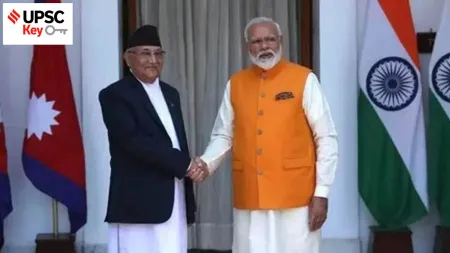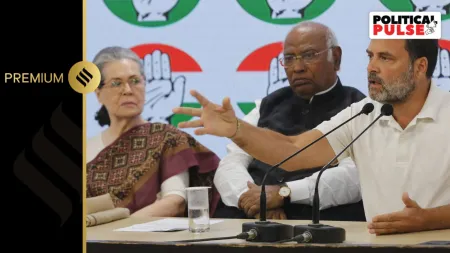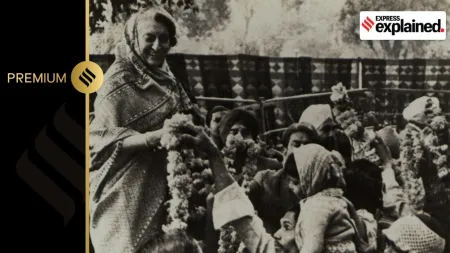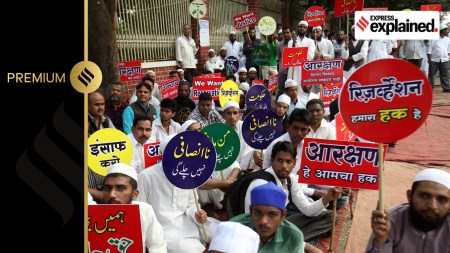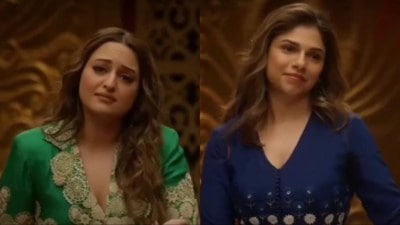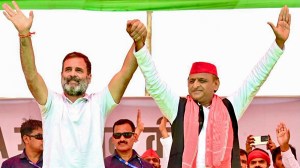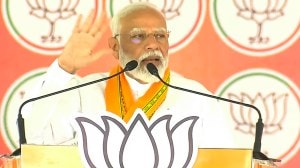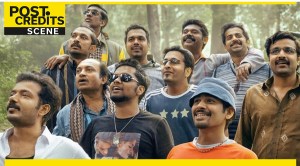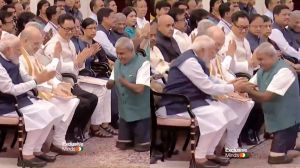- India
- International
A melody for the mind: The story of ‘Sitar for Mental Health’
Rishab Rikhiram Sharma talks about his tryst with the sitar, his guru, the sitar virtuoso, Pandit Ravi Shankar, his struggles with mental illnesses and conceptualising the ‘Sitar for Mental Health’.
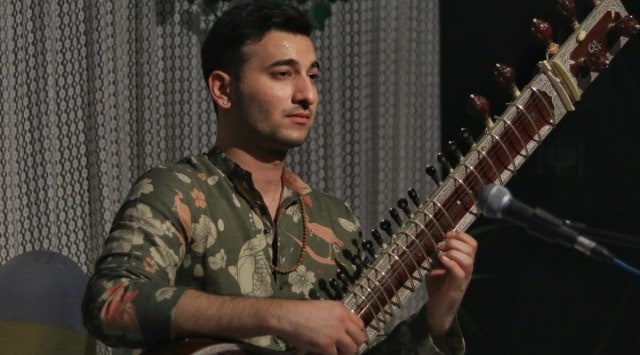 Rishab Rikhiram Sharma is the fourth generation of the well-known Rikhi Ram family of luthiers based in Delhi. (Express photo)
Rishab Rikhiram Sharma is the fourth generation of the well-known Rikhi Ram family of luthiers based in Delhi. (Express photo)For sitarist, composer and music producer Rishab Rikhiram Sharma, music has been a part of his inherited family legacy, a career growing up and a medium for his creations. After battling his own demons alone, Sharma found music as his aid in the healing process. ‘Sitar for Mental Health’ is the 23-year-old’s quest in pointing people to the mental health benefits one can find in the richness of the country’s classical music. On Friday, Sharma was in Pune for the second time on his tour with TIFA Working Studio and nrtyaculture, at The Poona Club Swimming Pool.
Sharma talks about his tryst with the sitar, his guru the sitar virtuoso Pandit Ravi Shankar, his struggles with mental illnesses and conceptualising the ‘Sitar for Mental Health’.
An inheritance and a guru’s blessing
Sharma is the fourth generation of the well-known Rikhi Ram family of luthiers based in Delhi. The business started across the borders in Lahore in 1920 and was then carried forward by his grandfather Bishan Dass Rikhiram and father Sanjay Rikhiram.
“It is a generational family business of the art form of making the finest musical instruments, particularly stringed instruments. My father wanted my brother and me to inherit the art and enrolled us on vocal and guitar lessons. His theory was that in order to make good instruments, one needs to be a musician first with tuned ears. Among them, the sitar is one of the most complex musical instruments as its make is very calculated and intricate,” said Sharma.
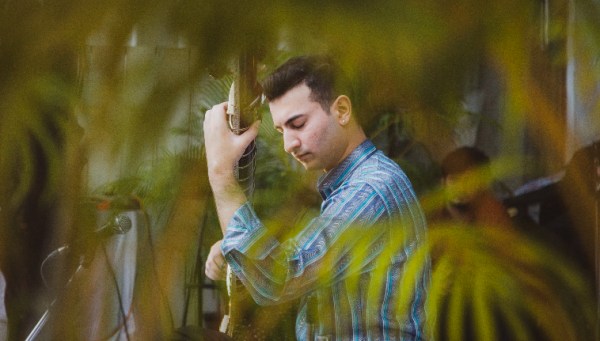 Sharma, became the youngest and last disciple of Pandit Ravi Shankar. (Express photo)
Sharma, became the youngest and last disciple of Pandit Ravi Shankar. (Express photo)
Sharma said that while growing up, he was a performer and a musically-inclined child. Yet, he did not hold the sitar until he was 10. “For my father, the sitar is a sacred instrument to be handled with the utmost respect and care. It was once when I made an attempt on a repaired sitar with the knowledge I had from my guitar exercises, that my father was astonished. He then started my lessons the very next morning. In 2011, at a concert in honour of my grandfather, Ustad Amjad Ali Khan saab asked me to play and I had played his compositions of the Tilak Kamod. A video of the performance on Youtube reached my Guruji’s wife and we were requested to visit him at his Ashram. When he asked my father to make me his disciple, it was like God presented himself to teach me,” he said.

Sharma, who became the youngest and last disciple of Pandit Ravi Shankar, shared that it was later that he realised the onus of the responsibility to take the sitar forward, as told by his guru. “We had an age gap of about eight decades but he was as much my guru as he was my best friend. He was the strictest teacher and at the same time a jovial person. He asked me to pick up as much as I could. He had told me that I should cater to my generation, a responsibility so big which I have come to realise now as I have matured,” he said.
Sharma continued his sitar training under Pandit Parimal Sadaphal, one of the senior most disciples of Pandit Ravi Shankar.
Music for the mind
During the onset of the pandemic, like many artists, Sharma too hit a wall as live performances started to seem obsolete. “2020 was when my mental health took a hit but it worsened after I lost my maternal grandfather, to whom I was very attached. I did not go out, just slept and ate. All this while, I did not play my sitar. I felt very demotivated and I was questioning why I was doing what I was doing,” he shared.
Sharma sought therapy and said that the first battle was within oneself, as one might feel they can get better on their own but it does not always work like that. After some sessions, Sharma’s therapist suggested that he go live on Instagram and perform with his sitar.
“It was in a way a thing which I did only for myself, to hold the Instagram live, even if no one saw. The platform called Clubhouse was also accumulating attention and I soon started inviting people to the performances for one’s mental health. The second wave of the pandemic began and times became dire. I was hosting a live session every single day during the time as people were grieving the loss of their dear ones and dedicating the sessions to them. It was a very minuscule way to help them cope with the loss. It was a lot to go through all at once but I tried to be consistent in showing up for myself through the live sessions,” he said.
Over time, Sharma’s online initiative built a community of over four thousand and he renamed the routine sessions ‘Sitar for Mental Health’ sessions. “It was like the sessions were for my mental health but at the same time was helping someone else’s too,” he said.
Sharma believes that the younger generation has been deprived of the real and soulful essence of classical music. He said that music has the power to uplift one’s mind but it has been heavily slept on. “People do not know how good our music sounds in the right setting. I wanted to curate the setting where the music is presented to the audience with perfection and where they understand the therapeutic qualities that music has,” he said.
Calling his project ‘Sitar for Mental Health’ a tri-layered pursuit, Sharma said that after he had spoken to a couple of psychiatrists and psychologists, he learned that while the sitar can make one feel better momentarily, one goes back to their lives, their reality, and hence there needs to be a dialogue created around severe mental illnesses and reaching out for help. “For me, the sitar became a therapeutic instrument. But I could not leave it just at that and therefore, to de-stigmatise mental health, I was vocal about my own struggles,” he said.
Carefully designed, the event begins with a gentle alap, then a purely classical performance while the latter part incorporates the fun, commercially known songs that people are familiar with, said Sharma. “I take note of the threshold people have for classical music in one sitting. The audience sits through the classical performance and develops an ear for it. Getting exposed to classical music makes them aware and slowly they will start to appreciate it,” he said.
Sharma is working on his album called Navaras, where each composition is on one emotion. “My favourite is Chanakya, based on Veeraras, one that I perform in every concert. Roslyn, which is among the first lo-fi sitar pieces and of course Tilak Kamod, which is a summary of my first lesson with my Guru, will also be a part of the performance. I try to use the sitar as an instrument but not restrict it to classical only. I expand its potential by experimenting with it as it is a very versatile instrument,” he said.
Click here to join Express Pune WhatsApp channel and get a curated list of our stories
May 10: Latest News
- 01
- 02
- 03
- 04
- 05





